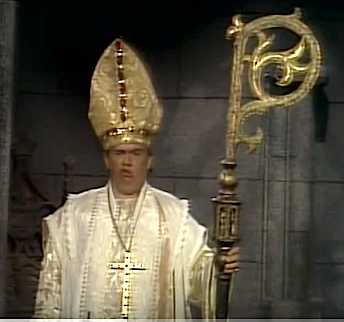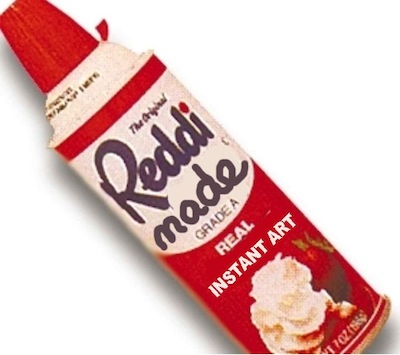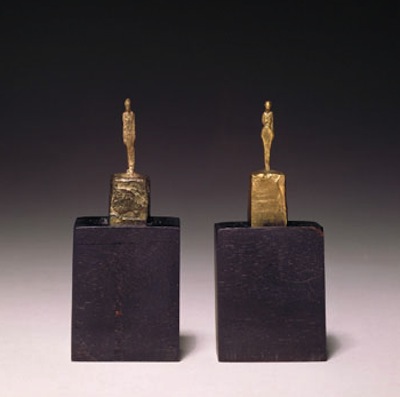
A Commentary on Philadelphia Arts and Artists, Minutiae, and Extraneum

"'Tis hard to say, if greater want of skill
Appear in writing or in judging ill;
But, of the two, less dang'rous is th'offence
To tire our patience, than mislead our sense."
--Alexander Pope
(left: John Candy on the NBC televison network's "SCTV" as "The Man Who Would Be Pope And King" (1981))
Right off the bat, I find myself wanting to point out what makes this essay superfluous. Native reasoning if not a mature sense of style should prevent this kind of sophomoric, self-effacing meta-text when ideas worth listening to ought be delivered unequivocably; so okay, I'm a crummy pitchman. like in that ancient panel by Dave Berg in MAD magazine, where a slovenly teen, thrown out of the house to find summer employment, leans over the counter at the local supermarket and says to the manager,"Hey, man, you wouldn't be needing any help around here, right?" Smooth.
But here's the deal. Pope says that a misleading critic does more harm than a tiresome writer, and his Essay on Criticism names as the chief failing of critics the inability to differentiate between personal taste, a foible, and the eternal standards of divine Nature. I tell you straight out, nothing divine in origin wields me as its mortal instrument. All the voices in my head are accounted for. My critical essays introduce various arts and artists to a wider audience if I can and champion a particular set of cultural values, but let me not make any pretense to the illuminating reason Alexander Pope believes in and describes.
What I write, I freely admit, is less sense than sensibility. The aesthetic one chooses accumulates as a reaction to innumerable clashes between an individual temperament and a particular environment. What it isn't is the culmination of human history or a binding prescription for how to make art. (No more manifestos!) My sensibilities were forged in the 60s and thereafter. A lot of bumping around, then I finally decided to conduct my affairs based on empirical evidence only, and that's a good bit harder than it sounds. Requiring physical evidence as the basis of judgment excludes looking upon the things I am and what I do as aligned by fate; I would never attribute my individual tastes and inclinations to the unfolding of a divine will.
The only hagiography I practice includes various characters created by Hanna-Barbera, Bob Clampett, and the 1966 television Batman. Regular-old broadcast televison was such an influence on my way of looking at the world that I can hardly believe my daughter's experience is less formed by it. I ought to have known the primacy of the unblinking TV was temporary because I heard my parents reminisce about the age of radio. How could I not know what was coming? Modernity was so warm and blanketing while it lasted, I didn't realize the triumph of progress was nothing but a style, like the smoky, gray translucence of a plastic turntable cover, the green glow of stereo amps and receivers in the dark, or an "artist's rendering" of the Eagle docking with the Command Module. Impressionist art reckoned with the technological innovation of photography and the Surrealists believed Freudian psychology would reveal the core of our experience. Similarly, I am an accident of my times; I understand the world in a particular way that is likely disposable, a consciousness batted around in some cosmic pinball machine for which replacement parts are no longer available.

How many artists remember to reckon the fine art to which they had access in their formative years a significant influence on their own aesthetic, and wasn't that a matter of happenstance and not destiny? Although I attended pubic grade schools when Delaware still offered art classes (another unique feature of my cohort), I got most of my training where Joseph Cornell and Francis Bacon got theirs—at the local museum. Giacometti claimed to have visited the Louvre about 5,000 times; my local was the Philadelphia Museum of Art.
Tell you what, being near ground zero of Marcel Duchamp's influence on a century of artists and movements had a huge impact on me who have visited his shrine at the PMA at least twice a year since 1974. My collage work appropriates a ready-made river of print, and I often use a pseudo-documentary voice akin to Duchamp's notes for The Large Glass or Étant donnés and those amazing suitcases he did full of miniature versions of his entire ouevre. My Atlas features two mocking documentaries at once: its useless babble about how to make a relief collage and its reference to an ubiquitous advertisement in the comic books I devoured as a youth. My masks of Sherman and Peabody or Bazooka Joe and Mortimer are other works that realize secular icons of my 60s upbringing and stamp them with fine art credentials. Thanks, Marcel! Thanks Rrose Sélavy!

I'm nearly finished this disclaimer, which will permit me to write in this space about local artists whom I think worthy of the reader's attention. I won't need to remind anyone my own preferences are idiosyncratic and accounting for them requires much unpacking of circumstance and trivia. On the topic of the influence of randomness on sensibility, Giacometti, after his Surrealist period, spent ten or fifteen years sculpting tiny ancestors for the monumental "Walking" and "Standing" figures of the 50s. He started with a sizeable piece of material but would shave and refine until it was no bigger than a toothpick. He literally kept a year's production of sculptures in a matchbox.
One day, Giacometti was crossing a Paris square and a horse-drawn carriage ran over his instep. The injury was serious enough he went to hospital, but did not remain to finish treatment.The inexplicable result of this accident was that Giacometti was finally able to work in a larger scale. The inhibition that restrained him was somehow cured. We can't tell why; James Lord, Giacometti's biographer, relates the anecdote, but cannot explain the corresponding internal transformation.
I put this out there as a sort of answer to those who will complain that my unwillingness to accept spiritual values as constants, or aesthetical manifestos as anything less than vulgar comedies precludes my own opinions from being worthwhile. On the contrary, the mysteries of human motivation are always profoundly interesting for the very reason that the mental processes of others are impossible to observe.
--12.2013